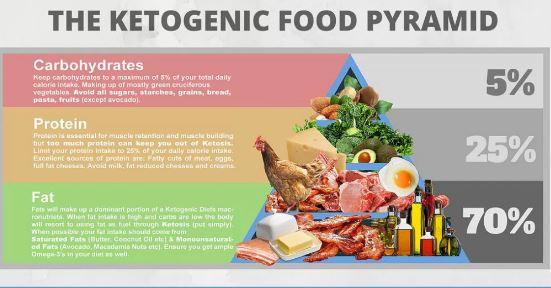
Our bodies break down carbohydrates and starches you eat into a simple sugar called glucose, which is transported from the bloodstream into our cells by the hormone insulin where it can be used for energy. Insulin also signals the liver to stop producing sugar.
Sometimes things go wrong, such as in diabetes, when our bodies allow blood glucose (sugar) levels to rise higher than normal. This hyperglycemia comes in two forms. In Type 1 Diabetes, the body does not produce insulin and it must be introduced artificially. In Type 2 Diabetes, which is 95 percent of people with diabetes, the body instead develops insulin resistance, primarily due to overconsumption of food, and the pancreas which made extra insulin to handle the extra blood glucose became overtaxed until it was no longer able to keep blood glucose at normal levels.
Ketogenic diets are where participants consume low amounts of carbohydrates and high amounts of fat. Like all crash diets, proponents tout short-term weight loss but a new study finds that an increased risk of Type 2 diabetes in the early stage of the diet may also be on the plate.
Ketogenic diets linked to insulin resistance in the liver
In a mouse study conducted by ETH Zurich in conjunction with University Children's Hospital Zurich, the researchers found that ketogenic diets were linked to improper blood sugar level control and there was insulin resistance in the liver. It involved feeding mice two different types of diet (a ketogenic diet and a high fat diet, which causes the liver to become resistant to insulin) and then performing standard metabolic tests on them. Using specialized procedures the researchers were able to determine the effects of internal sugar production from the animal (mostly the liver), and sugar uptake into tissues (mostly the muscle), during insulin action.
When the liver is unable to respond to normal levels of insulin to control blood sugar levels this may lead to an increased risk of Type 2 diabetes.
There are confounders. Despite what anti-science activists like to claim when results will help their fundraising or lawsuits, mice are not little people. And Type 2 Diabetes is frequently linked to obesity. The Ketogenic Diet has not been a fad for long enough to know if it causes obesity. Outside excess glucose production leading to insulin resistance, the aetiology of Type 2 Diabetes is unknown, so they don't have a biological mechanism to explain the process.
Generally speaking, all diets are good, and if a crash diet helps get someone on the path to thinking about weight and health long-term, that is welcome, but fad diets carry risks. The best solution remains a sensible diet and exercise.


